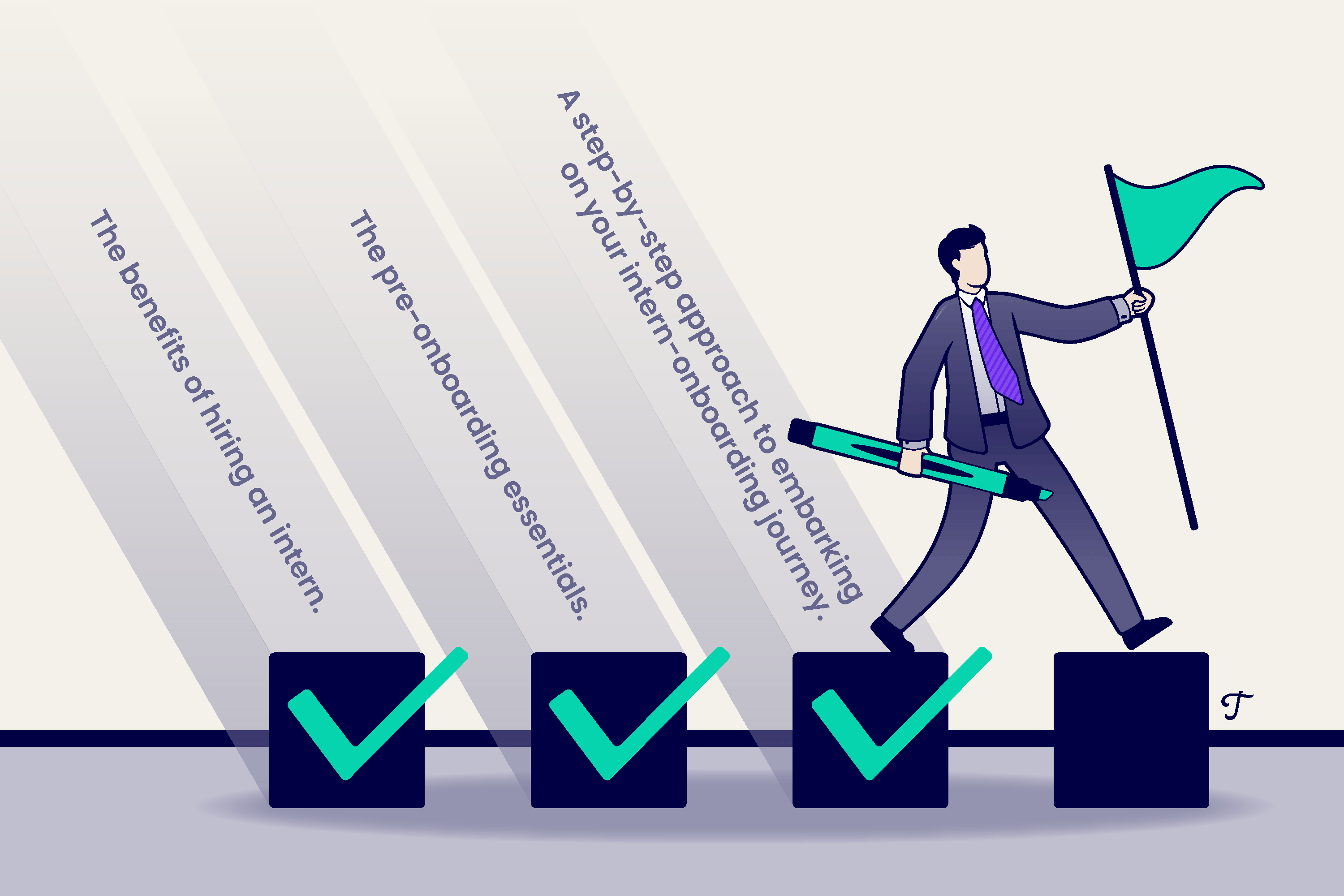
Articles
Beyond Coffee Runs: The How-To Guide for Hiring Interns
May 10, 2022

So, you’re ready to hire an intern? The process of bringing one on can be starkly different from hiring a part-time or full-time employee. It’s important to understand those differences, all applicable laws, and the different ways your intern and your company can mutually benefit one another.
According to Fast Company, there are over 300,000 interns ready to test the career waters in the U.S. each year. That means, there’s a whole lot of learning going on!
While their demographic can range from recent high school graduates to college students (or even college grads), they all share one thing in common — interns are trying to gain meaningful, real-world experience that can help them transition to employment.
One thing that they’re not, however, is free labor for a company (or an in-house coffee runner). Interns are often talented individuals with limited work experience. When you onboard them, you’ll need to take a different approach from your typical new hire.
In general, an internship needs to be beneficial for all parties. We’ll cover the ins and outs of this process, so you can create a worthwhile learning experience for your intern.
Hiring an intern: the rundown
Maybe you’re thinking about onboarding an intern. But it’s your first time, and you aren’t sure how to go about doing it. Maybe you have no idea what goes into planning and preparing for that process.
We’ll walk you through the essentials you’ll need to keep in mind before you welcome an intern onto your team. This is what we’ll cover:
- The benefits of hiring an intern.
- The pre-onboarding essentials.
- A step-by-step approach to embarking on your intern-onboarding journey.
How does hiring an intern benefit your company?
There are countless ways an intern can make a positive impact on your business, and maybe even redefine your company culture. Let’s explore all of the ways they can do that.
New perspectives.
With the business of everyday work, teams are often too busy to step back and dedicate time to creating innovative solutions to problems or processes. More often than not, they’re trying to do the best they can to accomplish the duties of their respective roles.
With an intern, however, you’ll have access to a fresh set of eyes, which means a new perspective. And that alone is worth its weight in gold. Sometimes, it takes an outsider's perspective to identify a pain point or provide a smart fix to a problem.
Mentorship and leadership opportunities for your existing team.
When you bring an intern into the ranks, it can create a domino effect of benefits that spreads company-wide. Remember: the internship experience should be mutually beneficial for everyone involved.
One way to get a clearer idea of your employees' leadership and mentoring skills is to observe them with your intern. Any opportunity to demonstrate their leadership capacity can lead to increased productivity and engaged employees.
The essential intern recruitment process checklist.
Before you begin onboarding your intern, you’ll need:
- A clear understanding of why you want to bring an intern on board.
- A succinct list of duties and responsibilities for your intern.
- Access to the rules governing the internship (if your intern will be receiving college credit).
- An idea of how long the internship will last.
- The hours and location where your intern will work.
- Access to applicable laws for hiring an intern.
A step-by-step guide to successfully hiring an intern.
Step 1: Examine your reasons for wanting to hire an intern.
While the idea of welcoming another set of hands may sound appealing, you should have a clear idea of why you want to hire an intern in the first place. Of course, any plan you make will likely need adjusting once they begin — that’s part of the learning process!
A clear plan — detailing how you can contribute to their learning experience and how they can benefit your company — helps make the entire experience rewarding for everyone. And, who knows? Maybe after the internship, they’ll become an employee.
Let’s explore some of the most common reasons a company might hire an intern.
An intern can alleviate your employees’ workload.
An internship should include as many learning opportunities as possible. The more hands-on, the better. An intern will likely be able to assist most (if not all) of your team members in some capacity.
Who wouldn’t love to delegate some of their daily responsibilities, while simultaneously contributing to someone’s learning experience in a positive way? Talk about a win-win!
An opportunity to mentor new talent.
Being part of someone’s educational journey as a mentor is deeply rewarding. . It also empowers your team by offering them leadership roles with an opportunity to hone their skills and highlight what they’re capable of. Ultimately, that leads to job satisfaction (it shows you value and trust their expertise) and a more content workforce.
Interns are effective brand representatives.
New interns can breathe new life into a business. They’ll likely be an effective (and hopefully vocal) advocate for your brand. This means free advertising to a demographic you may not have focused on in the past.
Step 2: Know the employment laws around hiring interns.
The laws governing internships vary from country to country. For example, according to the Department of Labor’s Fair Labor Standards Act, unpaid internships are legal in the U.S. so long as the intern is the “primary beneficiary” of the internship arrangement.
Whereas in the UK, an unpaid internship is illegal. Unless, of course, the intern is a student and enters into an internship for less than one year.
Be sure to carefully review the applicable laws surrounding internships. That’s for the intern’s protection — and for your company, too.
Step 3: Narrow down the ideal intern profile.
When you close your eyes and imagine the ideal intern, what do you see? A super energetic and conscientious person? An innovative thinker? A confident person with leadership skills? All of the above?
Although an intern’s time with your company isn’t typically permanent, they should still add something unique to your company culture.
In this respect, you’ll want to take a similar approach to hiring your intern as you would for any employee. And that’s hiring them for culture add, not a culture fit. You want to create a diverse and inclusive workplace, regardless of the person’s status in your company.
Step 4: Map out the internship details.
The devil’s in the details when it comes to planning an internship. For starters, it’s impossible to capture every detail of what’s supposed to be a learning experience. There will be hiccups along the journey. That’s a normal part of learning — embracing the inevitable trial and error.
Instead of trying to outline every tiny detail of their internship, you’ll want to ask yourself the following questions and remain open to potential (and inevitable) changes to the answers:
- What duties and responsibilities will they have?
- Who will they report to?
- What are your expectations of their time with your company?
- Where will they work — in the office? Remotely?
- How long will the internship last?
- Will it be a full-time or part-time internship?
- Will it be paid or unpaid? If the former, what compensation and perks will you offer?
- If they are interning as part of a university requirement, how does the university’s criteria for the internship align with yours?
Step 5: Create a unique intern hiring process, separate from your employee hiring process.
Think you can hire an intern in the same way you would an employee? Think again.
For one, an intern may only remain a temporary part of your company culture. Of course, you still need to create a safe and inclusive experience for them. Also, if your intern is receiving college credit for their internship, you might need to follow a different set of rules entirely.
No matter what, you’ll want to remember the differences between hiring an intern and an employee. That starts with how their purposes differ.
Step 6: Always communicate and check in with your intern.
Bringing an intern on board is just the first step. A hands-off approach won’t do you (or them) any good. For one, they’re likely interning to learn everything they can. They’re sponges who want to know as much as they can while the stakes are low-ish (compared to a permanent employee, anyway).
You might want to offer them the opportunity to shadow one (or several) of your employees. That type of one-on-one interaction will give them the confidence and the comfort level that comes with knowing they have a direct point of contact to go to should they have questions, concerns, or just run an idea by an eager listener. No matter what, they need a support system — maybe even more so than a new employee.
Ready to give your intern the learning experience they deserve?
Providing your intern with a meaningful learning experience means making them feel part of the team from the start. That also means showing them they’re an integral part of your company culture.
Similar to a new employee, you’ll need to give your intern what they need to succeed. Incorporating them into your company playbook can give your new intern a strong sense of inclusion, knowing they are a part of your team.
That’ll leave a strong, positive impression. And, if they do end up being a total rockstar, you might end up offering them permanent employment. And that means less time and resources spent training them.
Stay open to that possibility by thinking beyond the term of the internship. And should an employment position open up, you’ve already invested in their training. In the meantime, make sure your intern has everything they need to get the most out of their internship experience.
Similar Blog Posts




.avif)





